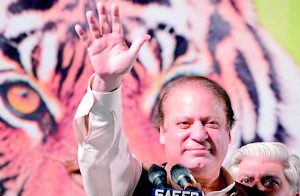Sunday Times 2
Pakistan’s Sharif free to rule without unwieldy coalition
View(s):ISLAMABAD (Reuters) – Pakistan Prime Minister-elect Nawaz Sharif won enough seats in Saturday’s parliamentary election that he won’t need to form a coalition with other major parties to push through badly needed reforms, final figures showed.
Sharif’s Pakistan Muslim League-Nawaz (PML-N) won 124 of a total 272 seats, with its nearest rival, the Pakistan People’s Party (PPP), winning 31, in the country’s first democratic handing over of power since independence in 1947.
To achieve the required majority of 137, he need only secure support from a handful of like-minded independents.

Pakistan Prime Minister-elect Nawaz Sharif
The outgoing PPP-led coalition, formed after the previous election in 2008, faced continued threats of defections when it confronted unpopular decisions, part of the reason for its lack of success.
Pakistan Tehreek-e-Insaf, the party led by former cricketer Imran Khan, took 27 seats, making it Pakistan’s third-largest party. It held just one in the last election.
The new government will have its hands full with problems ranging from chronic power shortages, a near-failed economy, a Taliban insurgency and building relations with the United States and arch rival India.
“Top-most amongst these challenges include external support to avert a balance-of-payments crisis, carrying out difficult structural reforms, and balancing diplomatic relations with the U.S.,” Moody’s Investors Service said.
“The new government will inherit the effects of overall policy inertia. And it is uncertain as to whether it will use its power to adopt policies that will help shore up a weakening external payments position and reforms that would boost economic growth,” Moody’s said.
“It is worth noting that the previous civilian government which served out its full term had been unable to come to grips with these same challenges.” There will be recounts or re-polling in 11 constituencies where there were “law and order” concerns, accusations of vote rigging or, in two seats, deaths of candidates, the Election Commission said, adding that the polls had been the most successful in the country’s history.
Khan, recovering in hospital after a fall from a fork-lift taking to him an election campaign podium, has given the commission three days to investigate vote rigging, failing which his party would launch protests across the country, media said.
But accusations of vote rigging were the norm, commission deputy director Khurshid Alam said on Thursday.
“In 2008, there were more than 300 complaints. This time, there were only 53,” he said. “This election is the most transparent and good.”
| Khan to form coalition in Pakistan province
Imran Khan’s Pakistan Tehrik-e-Insaf (PTI) is set to form a coalition government in the militancy-hit Khyber-Pakhtunkhwa province with the support of the Jamaat-e-Islami and Qaumi Watan Party. |
Follow @timesonlinelk
comments powered by Disqus

